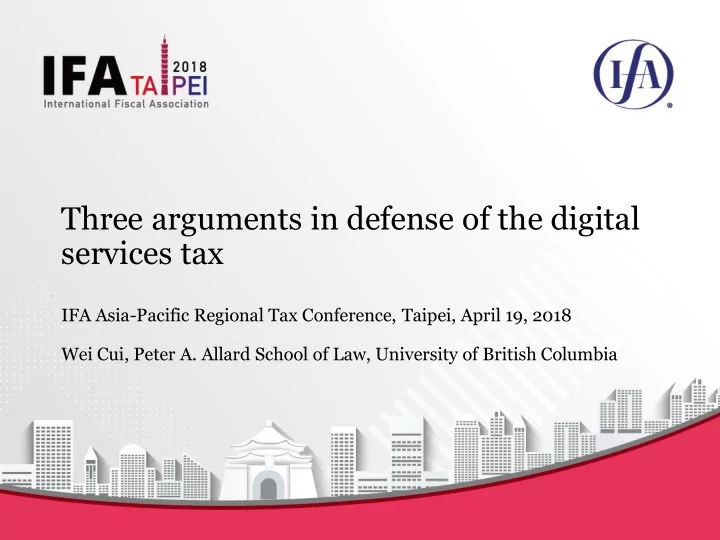

Three arguments in defense of the digital services tax IFA Asia-Pacific Regional Tax Conference, Taipei, April 19, 2018 Wei Cui, Peter A. Allard School of Law, University of British Columbia
Reactions • Practitioners: • Clifford Chance, “Missing the target? The surprising scope of the proposed new EU digital services tax”. • Scholarly critique: • Becker and Englisch : “badly motivated and fails to reach every single goal mentioned by the Commission. It creates a nightmare of complexity and legal uncertainty.” • Schön :“There exists no consensus on the impact of the concept of ‘value creation’ in the age of digitalization…it seems premature and hazardous to build a house on a foundation not yet fully developed and understood.”
A different view 1. Is the digital service tax properly motivated? 2. Is the scope of the digital tax arbitrary? 3. Who should take the blame for proposing a gross-revenue tax?
1. Location specific rent in the platform economy: elements of a coherent description (1) • Platform users typically do not produce information in exchange for services. Information is generated simply as byproduct of either consumption or commercial activities taking place on the platform. It is a pure externality.
Elements of a coherent description (2) • Companies that enable such platform consumption incur costs, which they recover by generating valuable — even marketable — information goods. Such information goods are used as inputs into further production, for both marketing and product design. The production of such information goods is characterized by network effects, economy of scale, intangible assets, etc.
Elements of a coherent description (3) • Such information goods tend to have only location-specific value. They will be inputs only to production of goods sold to the particular jurisdiction where users reside. In this sense, the rent the platform provider earns by (i) selling to other producers (not final consumers), or (ii) developing proprietary products, is location specific rent.
Elements of a coherent description (4) • Producers who purchase the information good of course do not earn this information rent. So any tax on the producer’s profits will not be able to reach it. • Therefore, there is location specific rent that is earned by firms through neither producing in, nor selling products to, the jurisdiction giving rise to the rent.
Summary • Proposals to tax such rent are different from: • Destination-based formulary apportionment for a profit tax, which does not target location specific rent. • Destination-based consumption taxes. • They are also superior to recent scholarly proposals for digital taxation, e.g. Schön’s proposal for taxation based on “digital investment”.
2. Is the scope of the digital tax arbitrary? • Two distinct issues: 1. To measure user-created value, the easiest approach is to track the monetization of such value. But better measurements clearly need to develop: sales to advertisers do not adequately reflect user-created value. 2. A main motivation of the new tax is to capture location specific rent generated from market externalities. Traditional providers of advertising space may already be taxed on their location specific rent.
3. Who should take the blame for a gross- revenue tax? • Which is more irrational , the gross-revenue-based tax, or the commitment to a treaty framework that no longer reflects countries’ distributional preferences? • Which is a blunter instrument , a turnover tax targeted at digital services or tax treaties that prevent only formalistically-defined juridical double taxation, paying no attention to economic incidence, and at the considerable cost of double non-taxation?
Thank you and comments are welcome: cui@allard.ubc.ca! http://www.allard.ubc.ca/faculty- staff/wei-cui
Recommend
More recommend